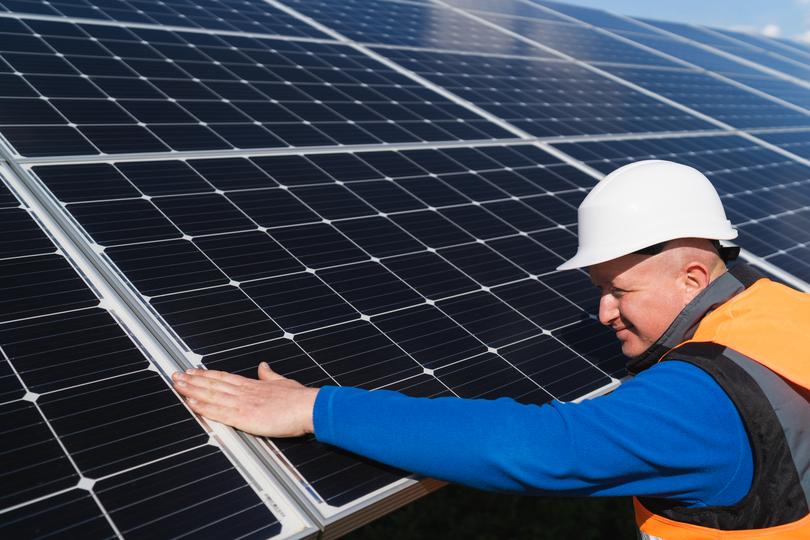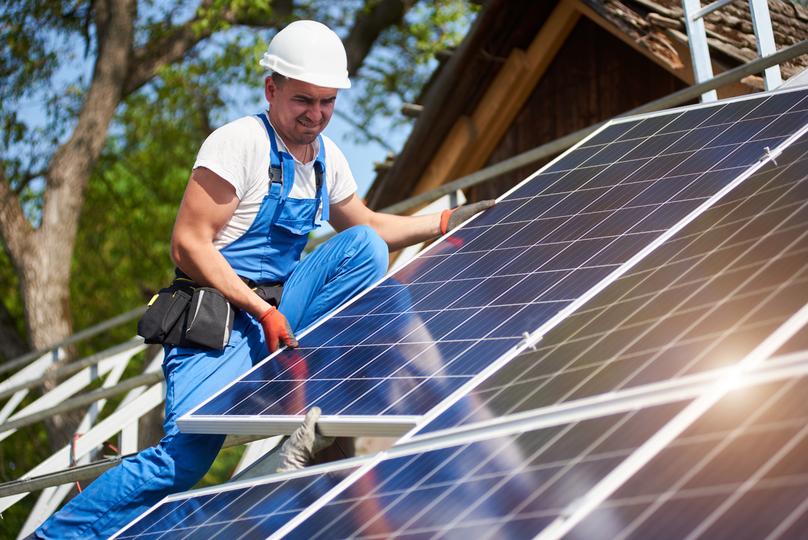Find The Best Solar Installers With SolarCompaniesHub
Go Solar the Easy Way
SolarCompaniesHub connects you with top-rated Solar Installers in USA. Get free quotes, compare solar panel options, and find the perfect installer for your home or business.

Solar Installers Near Me
Looking for Solar Installers in a specific city or region? Browse our directory to find qualified installers across USA.
Going Solar is Easy with SolarCompaniesHub
We make finding and connecting with qualified Solar Installers in USA a seamless process.

- Tell Us About Your Solar Needs
- Provide us with information about your property, energy consumption, and your desired solar system size or budget.
- Get Matched with Local Installers
- We'll connect you with reputable Solar Installers who serve your area and specialize in the types of solar installations you need.
- Compare Quotes & Choose Your Installer
- Review personalized quotes, compare services, and choose the Solar Installers who best meets your requirements and budget. We provide you with installer profiles, ratings, and customer reviews to help you make an informed decision.
- Go Solar & Start Saving!
- With the right Solar Installers on board, you're ready to start enjoying the benefits of clean, renewable energy and start saving on your electricity bills.
Why Choose SolarCompaniesHub for Your Solar Installation?
Why Choose SolarCompaniesHub for Your Solar Needs?
SolarCompaniesHub makes going solar simple and stress-free. Here's why homeowners and businesses in USA trust us: We make it easy to find and compare qualified solar installers in your area. Here's how:

- Vetted & Reliable Installers
- We partner with certified and experienced Solar Installers who meet our strict quality and safety standards. You can be confident you're getting the best service possible.
- Competitive Quotes, Easy Comparison
- Get multiple free quotes from different installers in your area, making it easy to compare prices, warranties, and services.
- Save Time & Effort
- Finding the right solar installer can be time-consuming. Let SolarCompaniesHub do the work for you! We connect you with qualified professionals quickly and easily.
- Unbiased & Independent
- We're an independent directory, not affiliated with any specific solar company. Our goal is to help you find the best solution for your needs.
- Customer Support
- Our team is here to assist you throughout your solar journey. If you have any questions or need help finding the right installer, we're here to support you.
- Free To Use
- Connecting with Solar Installers through SolarCompaniesHub is completely free. There are no hidden fees or obligations.
Reduce Your Business Energy Costs with Solar
Solar Solutions for Your Business
SolarCompaniesHub connects businesses with experienced commercial Solar Installers. Whether you need a system for a retail space, restaurant, hotel, school or any other commercial property, we can help you find qualified installers specializing in commercial solar projects in USA.

Reduce your business energy costs with solar. Find trusted commercial solar installers and get expert advice on your project.

Keep your solar panels running smoothly. We offer expert solar panel repair and maintenance services to maximize your energy savings.

Get free, no-obligation solar quotes from top-rated installers in your area. Compare prices and find the best solar solution for your needs.
Power Your Home with Clean Energy
Solar for Your Home
SolarCompaniesHub specializes in connecting homeowners with reliable Solar Installers. Find the right installer to design a system tailored to your home and your budget.

Find certified solar installers near you. Get quotes for solar panel installation, repair, and maintenance services.

Keep your solar panels running smoothly. We offer expert solar panel repair and maintenance services to maximize your energy savings.

Get free, no-obligation solar quotes from top-rated installers in your area. Compare prices and find the best solar solution for your needs.
Ready to Make the Switch to Solar?
Find The Best Solar Installers On SolarCompaniesHub!
Get started today! Compare quotes, explore options, and connect with qualified solar installers in your area.
Solar Installation Glossary
Solar Panels
Photovoltaic (PV) System
Solar Inverter
Net Metering
Solar Battery Storage
Solar Energy
Solar Power
Kilowatt (kW)
Kilowatt-hour (kWh)
Solar Panel Efficiency
Solar Panel Warranty
Solar Installation Warranty
Monocrystalline Solar Panels
Polycrystalline Solar Panels
Thin-Film Solar Panels
Frequently Asked Questions About Solar Installers
How do I find a good solar installer near me?
- Use a Directory Like SolarCompaniesHub: We connect you with pre-screened, qualified solar installers in your area.
- Check Online Reviews: Look for positive reviews on Google, Yelp, and other reputable sources.
- Ask for Referrals: Get recommendations from friends, family, or neighbors who have gone solar.
- Verify Credentials: Ensure the installer is licensed, insured, and certified by reputable organizations (e.g., NABCEP in the US).
- Get Multiple Quotes: Compare quotes from at least 3-4 installers to find the best value for your project.
- Ask Questions: Don't hesitate to ask installers about their experience, warranties, and the process they follow.
What is the average cost of solar panel installation in USA?
- System size (measured in kilowatts, or kW)
- Type of solar panels (monocrystalline, polycrystalline, thin-film)
- Roof complexity (pitch, size, obstructions)
- Labor costs in your area
- Available incentives and rebates
How long does it take to install solar panels?
- System size
- Roof complexity
- Weather conditions
- Permitting and inspections
- Installer's schedule
What are the different types of solar panels?
- Monocrystalline: Made from a single silicon crystal, known for high efficiency (typically 18-22%) and sleek black appearance.
- Polycrystalline: Made from multiple silicon crystals, slightly less efficient (15-17%) but often more affordable than monocrystalline.
- Thin-film: Made from thin layers of photovoltaic material, lower efficiency (8-12%) but can be flexible and lightweight.
How do solar panels work?
What is the lifespan of solar panels?
Do I need planning permission to install solar panels in USA?
How do I maintain my solar panels?
- Keep Panels Clean: Clean panels periodically to remove dirt, debris, and bird droppings, which can reduce efficiency. Rainfall usually cleans panels adequately, but you might need to hose them down occasionally.
- Visual Inspections: Regularly inspect panels for signs of damage, loose wiring, or other issues.
- Professional Maintenance: Consider having a professional solar installer inspect your system every few years to ensure optimal performance.
Will solar panels work during cloudy days or at night?
What happens if my roof needs to be replaced after I install solar panels?
Are there any financial incentives for going solar?
- Tax Credits: Reduce your income tax liability based on the cost of your solar system.
- Rebates: Direct cash payments or discounts on the purchase of a solar energy system.
- Net Metering: Allows you to sell excess solar electricity back to the grid for credits.
- Renewable Energy Certificates (RECs): Tradeable credits representing the environmental attributes of your solar energy generation.
Do solar panels increase my home value?
How much can I save on my electricity bill with solar panels?
- Your current energy usage
- The size of your solar system
- Your local electricity rates
- The amount of sunlight your panels receive
- Available net metering policies
Can I go completely off-grid with solar panels?
What is the difference between grid-tied and off-grid solar systems?
- Draw electricity from the grid when your solar panels aren't producing enough power (e.g., at night)
- Sell excess solar electricity back to the grid through net metering.
How do I know if my roof is suitable for solar panels?
- Adequate Sunlight: Unobstructed sunlight for a significant portion of the day.
- Sufficient Space: Enough space to accommodate the desired number of panels.
- Structural Integrity: A strong roof structure capable of supporting the weight of the panels.
- Appropriate Orientation and Tilt: Ideally, the roof should face south (in the Northern Hemisphere) or north (in the Southern Hemisphere) with a tilt angle close to the latitude of your location. However, other orientations and tilts can still be effective.
Do I need to replace my roof before installing solar panels?
How do I choose the right solar panel system size for my needs?
- Analyze your energy bills
- Assess your roof's suitability
- Calculate your potential solar energy generation
- Recommend a system size that meets your needs and goals.
What are the different types of solar inverters?
- String Inverters: Connect multiple panels in a series (a 'string'). A cost-effective option for simple systems, but a single panel issue can affect the entire string.
- Microinverters: Attach to each individual solar panel, maximizing energy production even if some panels are shaded. They are more expensive but offer greater efficiency and monitoring capabilities.
- Power Optimizers: Similar to microinverters, but less expensive. They optimize the output of each panel and provide individual panel monitoring, but a central inverter is still required.
- Hybrid Inverters: Combine a solar inverter with a battery charge controller, allowing for seamless integration of battery storage.
What kind of warranty should I expect for my solar panel system?
- Solar Panel Warranty: From the panel manufacturer, typically covering defects in materials and workmanship for 10-25 years. Some manufacturers offer performance guarantees, ensuring a certain level of energy output over time.
- Solar Installation Warranty: From the solar installer, covering the quality of the installation work for 1-10 years. This warranty protects you from leaks, faulty wiring, or other issues caused by improper installation.
What is net metering, and how does it work?
What happens to my solar panels during a power outage?
How can I finance my solar panel installation?
- Cash Purchase: The most straightforward option, providing the greatest long-term savings but requiring a larger upfront investment.
- Solar Loans: Loans specifically designed for solar installations, often with favorable terms and interest rates.
- Solar Leases: A third-party company owns the system and leases it to you, allowing you to go solar with little or no upfront cost, but you won't own the system or receive tax benefits.
- Power Purchase Agreements (PPAs): Similar to leases, but you pay for the electricity generated by the system, not the system itself.
- Home Equity Loans or Lines of Credit: Borrow against the equity in your home.
How do I get started with solar panel installation?
- Contact SolarCompaniesHub: We make it simple to connect with reputable Solar Installers in your area.
- Get Free Quotes: Request free quotes from multiple installers to compare prices, systems, and warranties.
- Schedule a Site Assessment: A qualified installer will visit your property to assess your roof, energy needs, and discuss your goals.
- Review Your Proposal and Contract: Carefully review the proposed system, financing options, and warranties before signing a contract.
- Installation and Activation: Once the contract is signed, the installer will obtain necessary permits, schedule the installation, and activate your solar system.
How do I find a good solar installer near me?
- Use a Directory Like SolarCompaniesHub: We connect you with pre-screened, qualified solar installers in your area.
- Check Online Reviews: Look for positive reviews on Google, Yelp, and other reputable sources.
- Ask for Referrals: Get recommendations from friends, family, or neighbors who have gone solar.
- Verify Credentials: Ensure the installer is licensed, insured, and certified by reputable organizations (e.g., NABCEP in the US).
- Get Multiple Quotes: Compare quotes from at least 3-4 installers to find the best value for your project.
- Ask Questions: Don't hesitate to ask installers about their experience, warranties, and the process they follow.
What is the average cost of solar panel installation in USA?
- System size (measured in kilowatts, or kW)
- Type of solar panels (monocrystalline, polycrystalline, thin-film)
- Roof complexity (pitch, size, obstructions)
- Labor costs in your area
- Available incentives and rebates
How long does it take to install solar panels?
- System size
- Roof complexity
- Weather conditions
- Permitting and inspections
- Installer's schedule
What are the different types of solar panels?
- Monocrystalline: Made from a single silicon crystal, known for high efficiency (typically 18-22%) and sleek black appearance.
- Polycrystalline: Made from multiple silicon crystals, slightly less efficient (15-17%) but often more affordable than monocrystalline.
- Thin-film: Made from thin layers of photovoltaic material, lower efficiency (8-12%) but can be flexible and lightweight.
How do solar panels work?
What is the lifespan of solar panels?
Do I need planning permission to install solar panels in USA?
How do I maintain my solar panels?
- Keep Panels Clean: Clean panels periodically to remove dirt, debris, and bird droppings, which can reduce efficiency. Rainfall usually cleans panels adequately, but you might need to hose them down occasionally.
- Visual Inspections: Regularly inspect panels for signs of damage, loose wiring, or other issues.
- Professional Maintenance: Consider having a professional solar installer inspect your system every few years to ensure optimal performance.
Will solar panels work during cloudy days or at night?
What happens if my roof needs to be replaced after I install solar panels?
Are there any financial incentives for going solar?
- Tax Credits: Reduce your income tax liability based on the cost of your solar system.
- Rebates: Direct cash payments or discounts on the purchase of a solar energy system.
- Net Metering: Allows you to sell excess solar electricity back to the grid for credits.
- Renewable Energy Certificates (RECs): Tradeable credits representing the environmental attributes of your solar energy generation.
Do solar panels increase my home value?
How much can I save on my electricity bill with solar panels?
- Your current energy usage
- The size of your solar system
- Your local electricity rates
- The amount of sunlight your panels receive
- Available net metering policies
Can I go completely off-grid with solar panels?
What is the difference between grid-tied and off-grid solar systems?
- Draw electricity from the grid when your solar panels aren't producing enough power (e.g., at night)
- Sell excess solar electricity back to the grid through net metering.
How do I know if my roof is suitable for solar panels?
- Adequate Sunlight: Unobstructed sunlight for a significant portion of the day.
- Sufficient Space: Enough space to accommodate the desired number of panels.
- Structural Integrity: A strong roof structure capable of supporting the weight of the panels.
- Appropriate Orientation and Tilt: Ideally, the roof should face south (in the Northern Hemisphere) or north (in the Southern Hemisphere) with a tilt angle close to the latitude of your location. However, other orientations and tilts can still be effective.
Do I need to replace my roof before installing solar panels?
How do I choose the right solar panel system size for my needs?
- Analyze your energy bills
- Assess your roof's suitability
- Calculate your potential solar energy generation
- Recommend a system size that meets your needs and goals.
What are the different types of solar inverters?
- String Inverters: Connect multiple panels in a series (a 'string'). A cost-effective option for simple systems, but a single panel issue can affect the entire string.
- Microinverters: Attach to each individual solar panel, maximizing energy production even if some panels are shaded. They are more expensive but offer greater efficiency and monitoring capabilities.
- Power Optimizers: Similar to microinverters, but less expensive. They optimize the output of each panel and provide individual panel monitoring, but a central inverter is still required.
- Hybrid Inverters: Combine a solar inverter with a battery charge controller, allowing for seamless integration of battery storage.
What kind of warranty should I expect for my solar panel system?
- Solar Panel Warranty: From the panel manufacturer, typically covering defects in materials and workmanship for 10-25 years. Some manufacturers offer performance guarantees, ensuring a certain level of energy output over time.
- Solar Installation Warranty: From the solar installer, covering the quality of the installation work for 1-10 years. This warranty protects you from leaks, faulty wiring, or other issues caused by improper installation.
What is net metering, and how does it work?
What happens to my solar panels during a power outage?
How can I finance my solar panel installation?
- Cash Purchase: The most straightforward option, providing the greatest long-term savings but requiring a larger upfront investment.
- Solar Loans: Loans specifically designed for solar installations, often with favorable terms and interest rates.
- Solar Leases: A third-party company owns the system and leases it to you, allowing you to go solar with little or no upfront cost, but you won't own the system or receive tax benefits.
- Power Purchase Agreements (PPAs): Similar to leases, but you pay for the electricity generated by the system, not the system itself.
- Home Equity Loans or Lines of Credit: Borrow against the equity in your home.
How do I get started with solar panel installation?
- Contact SolarCompaniesHub: We make it simple to connect with reputable Solar Installers in your area.
- Get Free Quotes: Request free quotes from multiple installers to compare prices, systems, and warranties.
- Schedule a Site Assessment: A qualified installer will visit your property to assess your roof, energy needs, and discuss your goals.
- Review Your Proposal and Contract: Carefully review the proposed system, financing options, and warranties before signing a contract.
- Installation and Activation: Once the contract is signed, the installer will obtain necessary permits, schedule the installation, and activate your solar system.